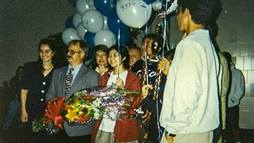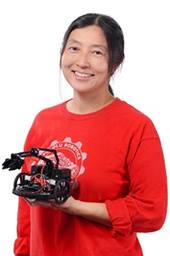Champions in Science: Profile of Candice Kamachi, National Science Bowl® Champion
Photo courtesy of Candice Kamachi
Candice Kamachi (in red coat) and her teammates were greeted as they arrived home in California after winning the 1996 National Science Bowl® in Washington, D.C.
"Looking back, I can see how much the Science Bowl meant to my life."
In 1996 Candice Kamachi was a senior and a member of the National Science Bowl® (NSB) team at Venice High School in Los Angeles, California. Today she is the Vice President of Operations at Pololu Robotics, the design and manufacturing firm she, her husband, and a friend started while they attended MIT.
Kamachi had watched other students at Venice High preparing for the annual science bowls. "I wanted to get involved mostly out of curiosity. Once you are interested, there is a lot of competition to get on the team — only five spots. I would go to practices — even before I was on the team. You watch the team practice, and then the next year, it's your turn to try out.
"Just the exposure to the other kids — I knew these kids; we were taking AP classes together. But it is a different dynamic to be on a team and do this together. That was a nice benefit of this style of competition. It is not sitting down and taking a test," she explains. "Aside from being more fun for the spectators, giving this team aspect to it — you work together. That is what made it possible to become friends, get close, go to each other's house, and study together. We did a lot of teaming up at each other's house, studying; it was a springboard into more socialization.
"We'd be in line for a movie, carrying our books. I don't think we actually opened them," she recalls, laughing. "But it was the idea that we could. We did a lot of learning on our own. It gave me an excuse to be reading a textbook at 3 a.m. And it was a good side benefit that I learned how to learn something from a book by myself."
That 1996 team won the National Science Bowl® Championship, changing Kamachi's plans for her future. The Science Bowl practices, competitions, and new experiences with her teammates offered her new opportunities and insights. "Once we'd won the Science Bowl, we got to go to Berkeley Lab." [Ed. Note: The championship prize for the 1996 competition was a week at U. S. Department of Energy's Lawrence Berkeley National Laboratory.]
"Speaking to the scientists, I could understand the science and appreciate it. I realized if I wanted to, I could do this. And meeting students not that much older than me, I thought, 'If they can do it, so can I.'"
Photo courtesy of Candice Kamachi
Candice Kamachi is Vice President of Operations at her robotics design and manufacturing firm, Pololu Robotics.
Kamachi had planned to attend college in California after graduation. "I hadn't thought of trying for MIT," she remembers. "I didn't know I could get into MIT — especially if you are a girl and maybe not so confident in technology."
Four years later, she graduated sixth in her major with a B.S. in mathematics from MIT. "It was nice to be put in a situation and rise to the occasion. MIT definitely helped to push me. That's why I am so thankful for the Science Bowl."
While attending MIT, her husband and a friend were running a student robotics competition and with Kamachi, turned their desire for quality parts into a business. Along with that friend's wife and Kamachi's husband's friend from high school, the group grew the firm from its origins in Massachusetts to a staff of 65 in an 86,000-sq. ft. facility in Las Vegas, Nevada.
"Even though I don't do technical work anymore, the problem-solving skills I learned studying math and science has helped me through every day since we started Pololu," says Kamachi. "Our first 'child' is turning 16 this year and we are still having fun. For me, running the company and making it a great place to work is very satisfying."
Kamachi likes to tell the student interns at Pololu Robotics, "Take all the opportunities you can, talk to adults and people around you. They are trying to help you so take advantage of that. Ask for advice; ask everybody.
"Don't waste opportunities; if you are considering the Science Bowl, I would say push yourself and do it. Looking back, as I thought about it, it made me realize that Science Bowl really changed my life."
**Candice Kamachi is sharing an email address for any NSB students that would like to contact her about robotics: inbox@pololu.com **
Profiles of Past Competitors: please go to https://science.energy.gov/wdts/nsb/about/historical-information/profiles-of-past-competitors/ to read more student stories about their NSB experiences.
The U.S. Department of Energy Office of Science manages the National Science Bowl® and sponsors the NSB finals competition. The Office of Science is the single largest supporter of basic research in the physical sciences in the United States and is working to address some of the most pressing challenges of our time. For more information please visit https://science.energy.gov.
Sandra Allen McLean is a Communications Specialist in the Office of Science, sandra.mclean@science.doe.gov.



